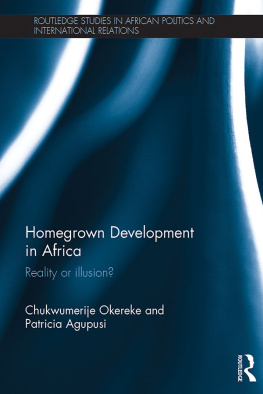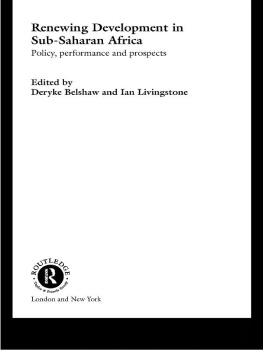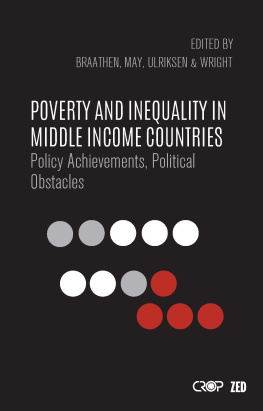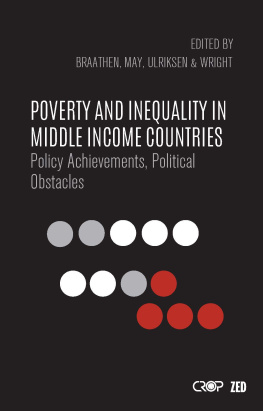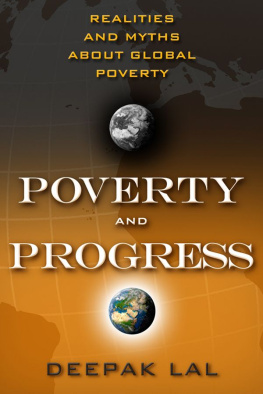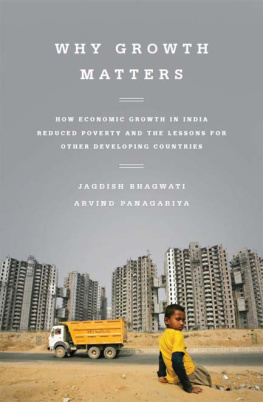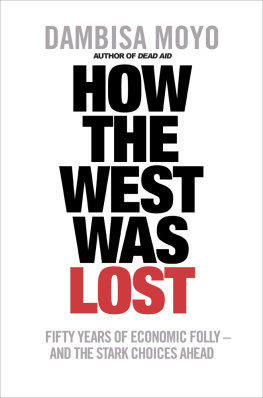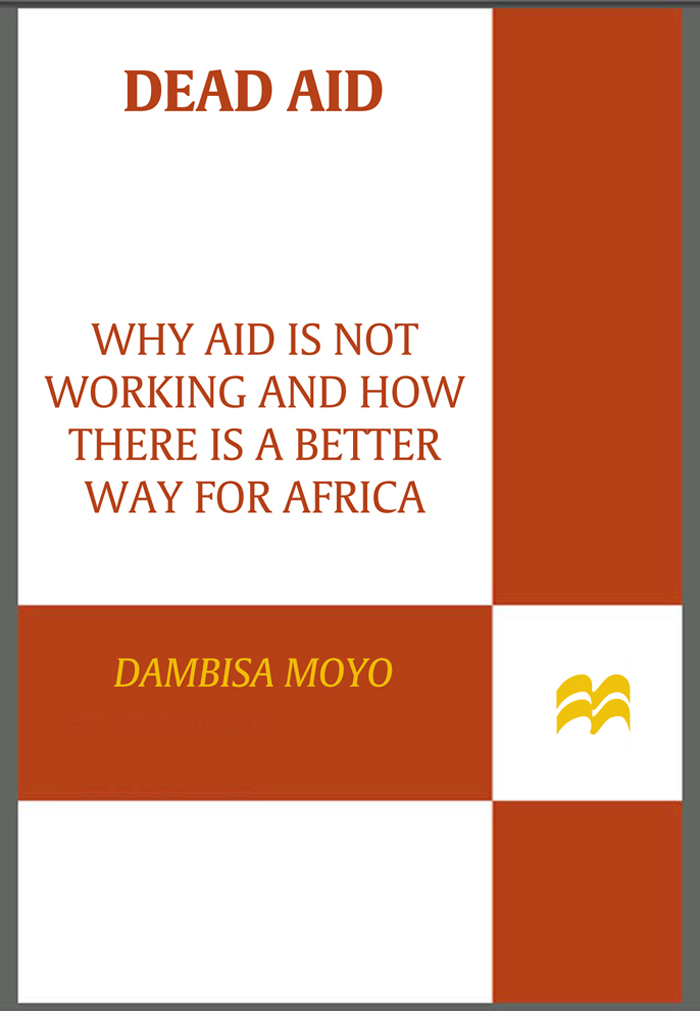Dead Aid
DEAD AID

WHY AID IS NOT WORKING
AND HOW THERE IS
A BETTER WAY FOR AFRICA
Dambisa Moyo
Farrar, Straus and Giroux
New York
Farrar, Straus and Giroux
18 West 18th Street, NY 10011
Copyright 2009 by Dambisa Moyo
Foreword copyright 2009 by Niall Ferguson
All rights reserved
Distributed in Canada by Douglas & McIntyre Ltd.
Printed in the United States of America
Originally published in 2009 by Allen Lane, an imprint of Penguin Books,
Great Britain, as Dead Aid: Why Aid Is Not Working and How There Is
Another Way for Africa
Published in the United States by Farrar, Straus and Giroux
First American edition, 2009
Library of Congress Cataloging-in-Publication Data
Moyo, Dambisa.
Dead aid : why aid is not working and how there is a better way for Africa / Dambisa Moyo.1st ed.
p. cm.
Includes bibliographical references and index.
ISBN-13: 978-0-374-13956-8 (hardcover : alk. paper)
ISBN-10: 0-374-13956-3 (hardcover : alk. paper)
1. Economic assistanceAfrica. 2. PoorAfrica. 3. AfricaEconomic conditions21st century. I. Title.
HC800 .M69 2009
338.91096dc22
2008055451
www.fsgbooks.com
1 3 5 7 9 10 8 6 4 2
For Peter Bauer
To the Excellencies and officials of Europe: We suffer enormously in
Africa. Help us. We have problems in Africa. We lack rights as
children. We have war and illness, we lack food... We want to study,
and we ask you to help us to study so we can be like you, in Africa.
Message found on the bodies of Guinean teenagers Yaguine Koita and
Fode Tounkara, stowaways who died attempting to reach Europe in the
landing gear of an airliner.
Contents
PART I
The World of Aid
PART II
A World without Aid
Foreword
by Niall Ferguson
It has long seemed to me problematic, and even a little embarrassing, that so much of the public debate about Africas economic problems should be conducted by non-African white men. From the economists (Paul Collier, William Easterly, Jeffrey Sachs) to the rock stars (Bono, Bob Geldof), the African discussion has been colonized as surely as the African continent was a century ago. The simple fact that Dead Aid is the work of an African black woman is the least of the reasons why you should read it. But it is a good reason nonetheless.
Born and educated in Zambia, Dambisa Moyo also brings to her subject a rare combination of academic expertise and real world experience. Her training in economics took her from the World Bank to Harvard and on to Oxford, where she obtained her doctorate. Since leaving the academy, she has spent eight highly successful years at Goldman Sachs, most recently as Global Economist and Strategist. It is quite a CV.
And this is quite a book. Though she is not the first writer to criticize Western aid programmes in Africa, never has the case against aid been made with such rigour and conviction. Why, asks Moyo, do the majority of sub-Saharan countries flounder in a seemingly never-ending cycle of corruption, disease, poverty, and aid-dependency, despite the fact that their countries have received more than US$300 billion in development assistance since 1970, The answer she gives is that African countries are poor precisely because of all that aid. Despite the widespread Western belief that the rich should help the poor, and the form of this help should be aid, the reality is that aid has helped make the poor poorer, and growth slower. In Moyos startling words: Aid has been, and continues to be, an unmitigated political, economic, and humanitarian disaster for most parts of the developing world. In short, it is (as Karl Kraus said of Freudianism) the disease of which it pretends to be the cure.
The correlation is certainly suggestive, even if the causation may be debated. Over the past thirty years, according to Moyo, the most aid-dependent countries have exhibited an average annual growth rate of minus 0.2 per cent. Between 1970 and 1998, when aid flows to Africa were at their peak, the poverty rate in Africa actually rose from 11 per cent to a staggering 66 per cent.
Why? Moyos crucial insight is that the receipt of concessional (non-emergency) loans and grants has much same effect in Africa as the possession of a valuable natural resource: its a kind of curse because it encourages corruption and conflict, while at the same time discouraging free enterprise.
Moyo recounts some of the more egregious examples of aid-fuelled corruption. In the course of his disastrous reign, Zaires President Mobutu Sese Seko is estimated to have stolen a sum equivalent to the entire external debt of his country: US$5 billion. No sooner had he requested a reduction in interest payments on the debt than he leased Concorde to fly his daughter to her wedding in the Ivory Coast. According to one estimate, at least US$10 billion nearly half of Africas 2003 foreign aid receipts leave the continent every year.
The provision of loans and grants on relatively easy terms encourages this kind of thing as surely as the existence of copious oil reserves or diamond mines. Not only is aid easy to steal, as it is usually provided directly to African governments, but it also makes control over government worth fighting for. And, perhaps most importantly, the influx of aid can undermine domestic saving and investment. She cites the example of the African mosquito net manufacturer who is put out of business by well-intentioned aid agencies doling out free nets.
Moyo offers four alternative sources of funding for African economies, none of which has the same deleterious side effects as aid. First, African governments should follow Asian emerging markets in accessing the international bond markets and taking advantage of the falling yields paid by sovereign borrowers over the past decade. Second, they should encourage the Chinese policy of large-scale direct investment in infrastructure. (China invested US$900 million in Africa in 2004, compared with just US$20 million in 1975.) Third, they should continue to press for genuine free trade in agricultural products, which means that the US, the EU and Japan must scrap the various subsidies they pay to their farmers, enabling African countries to increase their earnings from primary product exports. Fourth, they should encourage financial intermediation. Specifically, they need to foster the spread of microfinance institutions of the sort that have flourished in Asia and Latin America. They should also follow the Peruvian economist Hernando de Sotos advice and grant the inhabitants of shanty towns secure legal title to their homes, so that these can be used as collateral. And they should make it cheaper for emigrants to send remittances back home.
In Dead Aid, Dambisa Moyo does not pull her punches. In a perfect world, she writes, what poor countries at the lowest rungs of economic development need is not a multi-party democracy, but in fact a decisive benevolent dictator to push through the reforms required to get the economy moving. In other words, rushing to elections before economic growth has got underway is a recipe for failure. But her most radical proposal comes in the form of a question. What if, she asks, one by one, African countries each received a phone call... telling them that in exactly five years the aid taps would be shut off permanently?


